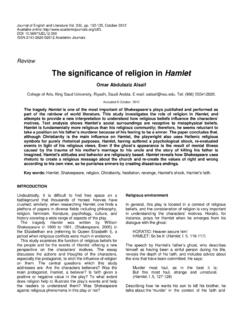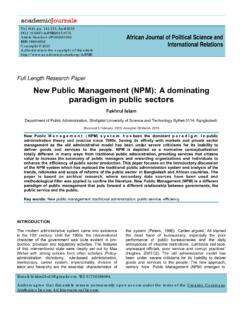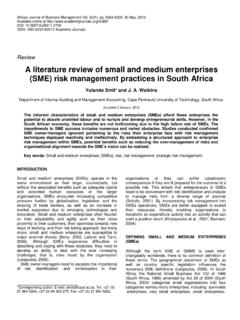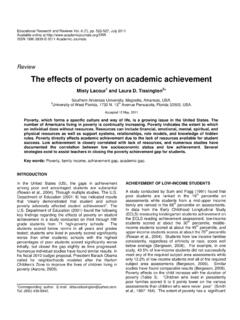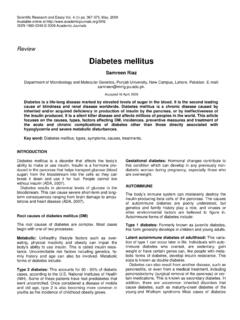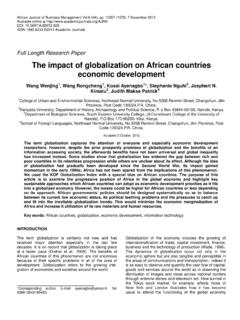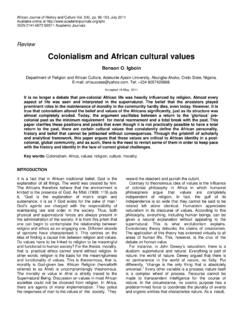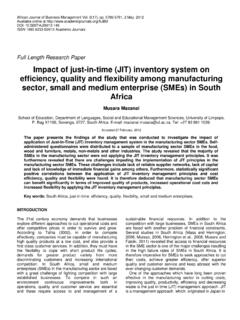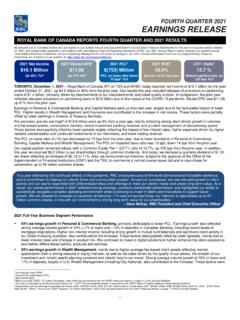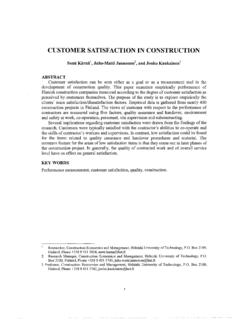Transcription of THE IMPACT OF EFFECTIVE CUSTOMER RELATIONSHIP …
1 African Journal of Marketing Management Vol. 4(1), pp. 17-29, January 2012 Available online at DOI: ISSN 2141-2421 2012 Academic Journals Full Length Research Paper The IMPACT of EFFECTIVE CUSTOMER RELATIONSHIP management (CRM) on repurchase : A case study of (GOLDEN TULIP) hotel (ACCRA-GHANA) George K. Amoako*, Emmanuel Arthur, Christiana Bandoh and Rachel Kafui Katah Department of Marketing, Central Business School Central University College, P. O. Box 2305, Tema, Ghana. Accepted 28 November, 2011 The purpose of this study was to determine the IMPACT of CUSTOMER RELATIONSHIP Management (CRM) on CUSTOMER loyalty in the hotel industry.
2 The study was conducted at the Golden Tulip hotel, Accra. The objectives of the study were to determine if (CRM) has an IMPACT on CUSTOMER loyalty, to determine if the practice of EFFECTIVE CRM in organisations leads to a long or short term financial IMPACT , to find out the extent or degree to which EFFECTIVE CRM leads to CUSTOMER satisfaction and to assess if the services provided by the hotel meets the needs and wants of customers. Questionnaires were administered to both individual and corporate clients of the hotel and the result of this was analyzed.
3 The results showed that of the respondents were females whilst were males. Most of the respondents had heard about the hotel from newspaper advertisements (40%) and referrals from people who had used the hotel (30%). 80% of the respondents were willing to refer to the services of the hotel to other people whilst 90% of them were satisfied with the services at the hotel. The accommodation and catering facilities were mostly patronized. The perception among respondents about the hotel was good since they gave a positive review of the services.
4 Most of the respondents agreed that they would come back to the hotel. The corporate clients were also satisfied with the services provided at the hotel with 20% having used the hotel for up to 4 years. The corporate clients said they would use the facility again, thus, CUSTOMER loyalty existed among these clients as well as, the individual clients. It is recommended that the hotel improves the cooling system in the conference room and provide better business centre facilities to attract more customers. Key words: CUSTOMER RELATIONSHIP management, CUSTOMER loyalty, hospitality industry, Ghana, repurchase .
5 INTRODUCTION CUSTOMER satisfaction is a business philosophy which tends to the creation of value for customers, anticipating and managing their expectations, and demonstrating ability and responsibility to satisfy their needs, (Dominici and Guzzo, 2010). Qualities of service and CUSTOMER satisfaction are critical factors for the success of any business (Gronoos, 1990; Parasuraman et al., 1988). As Valdani (2009) points out: enterprises exist because they have a CUSTOMER to serve. The key to achieve sustainable advantage lies in delivering high quality service that results in satisfied customers (Shemwell et al, 1998).
6 *Corresponding author. E-mail: Companies are facing their toughest competition ever. To win customers and encourage them to stay loyal or repurchase the service, most companies have resorted to meeting and satisfying CUSTOMER needs by not being only reactive but proactive. They are also interested in finding new ways and means to satisfy the CUSTOMER . Most companies are aiming for good CUSTOMER RELATIONSHIP which means better service to the CUSTOMER thereby preventing the CUSTOMER from being promiscuous.
7 A lot of companies are not just attracting customers, but are working at building long term relationships with customers (both local and foreign customers), suppliers, employees, distributors and the general public. These companies are striving to satisfy the maximized expectations of each stakeholder group. Based on the 18 Afr. J. Mark. Manage. nature of marketing, it involves voluntary exchange RELATIONSHIP where both sides must be willing parties. The parties must be able to communicate which could be through different instruments.
8 Therefore, in today s highly competitive environment, businesses need better understanding of their customers. This understanding meets different channels of which one is CUSTOMER RELATIONSHIP management. CRM helps companies make sense of CUSTOMER needs, manage these relationships more intelligently and help predict the future (Dominici and Guzzo, 2010). Sobotie and Oduro-Senya (2009) indicated limited revision of literature on CRM in Ghana. This research is therefore, an attempt to improve and contribute to knowledge in CRM operations in Ghana especially, how CRM impacts on organisational performance in the hospitality industry.
9 The paper describes how CRM helps organisations to achieve better results and how it can be used to effect repurchase behaviour. The paper also describes how the research was conducted using both individual and cooperate clients responses to arrive at conclusions. Problem statement and objectives CUSTOMER requirements for quality products and service in the tourism industry have become increasingly evident to professionals (Lam and Zhang, 1999; Yen and Su, 2004). Guest relationships are a strategic asset of the organization (Gruen et al.)
10 , 2000) and CUSTOMER satisfaction is the starting point to define business objectives. In this context, positive relationships can create CUSTOMER s higher commitment and increase their return rate. Long-term and reciprocally advantageous relationships between customers and the hotel is becoming progressively important because of the highly positive correlation between guests' overall satisfaction levels and the probability of their return to the same hotel (Choi and Chu, 2001).
